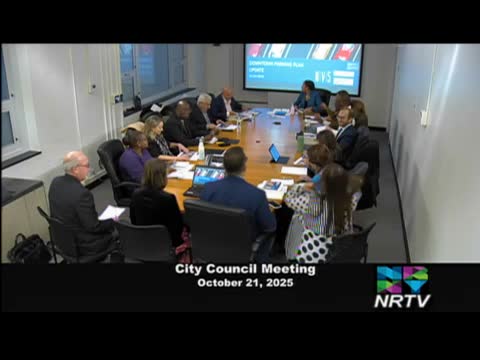City hears downtown parking plan update as consultants urge price, enforcement and wayfinding changes
Get AI-powered insights, summaries, and transcripts
Subscribe
Summary
Consultants and city parking staff told the City Council that managing existing parking, revising pricing and increasing enforcement could recover lost revenue and reduce street congestion; the council heard pilots for license-plate readers and text-to-pay but took no formal vote.
Consultants and city parking staff updated the New Rochelle City Council on a downtown parking management plan on Oct. 21, outlining short-, medium- and long-term steps intended to boost revenue, increase turnover in the business district and reduce curbside congestion.
The presentation, led by Sofia Kyle of NV5 and Gerard (Jerry) Giosa of Level G Associates with remarks from Rebecca Bonacci, New Rochelle’s director of parking, said the municipal system earned nearly $6 million in 2019 before the pandemic and has not recovered to that baseline. Kyle said “parking is a shared resource,” and that the city’s response needs to be “multifaceted” — including construction, regulation and cooperation with private developers.
Why it matters: The consultants said downtown demand exceeds street supply, while underused garages and lenient enforcement are costing the city revenue and contributing to perceived lack of parking on Main Street. The council and staff discussed options intended to encourage motorists to park in garages and free up curbside space for short visits and deliveries.
Key findings and proposals
- Revenue and enforcement: Consultant Jerry Giosa showed the system’s pre-COVID revenue near $6 million and noted that the New Rock garage’s transient income is still roughly $1 million below 2019 levels. Giosa said municipal enforcement is at about half the ticket-writing level seen in 2019 and that a low fine structure (a $25 overtime fine reduced to $15 if paid by day’s end) lowers compliance.
- Pricing changes: The consultants recommended differentiated or “demand-based” pricing that charges more for the most-coveted curb and downtown spaces and less for peripheral garages. They noted the city’s flat transient rate ($1.25 per hour) and pricing parity across locations provide no premium to encourage garage use over curbside parking.
- Permits and private garages: Consultants said some residential buildings charge substantially more for on-site parking than municipal permit prices, which encourages residents to rely on municipal spaces or street parking rather than private garages.
- Underused garages and wayfinding: The study found significant underutilized capacity in the New Rock and Transit Center garages; consultants recommended a wayfinding strategy and promotion so drivers know where garages are and how to reach them.
- Electric vehicle charging and new spaces: Staff said some EV charging remains free today and that partner agreements, like EVgo’s arrangement, influence usage patterns. Staff also reported nearly 200 additional municipal spaces are coming online soon; 80 of those will be close to the business district.
Pilots, short- and medium-term actions
- Already implemented: the administration said text-to-pay (phone pay) is now available. Staff also described an ongoing license-plate-reader pilot at the New Rock garage and the Transit Center led by the contractor L.A.Z. to explore a gateless payment system.
- Short-term: revise fine schedule and permit pricing, raise enforcement toward industry norms, allow pay periods longer than three hours at night, and implement a tiered transient pricing model in higher-demand zones.
- Medium-term: a curbside paid-loading pilot and a coordinated wayfinding program. The consultants recommended targeted stakeholder engagement and careful design for residential on-street permit zones; staff cautioned that some changes require state legislative approval.
- Long-term: license-plate-reader deployment for full revenue capture in garages, coordinated EV master-plan implementation, and phased meter expansion as downtown growth warrants. Consultants suggested a draft plan would be shared in January with a final in February and potential implementation steps targeting 2027–2028.
Council response and next steps
Several council members thanked staff and asked for specifics about enforcement, meter upkeep and how construction and circulation changes (including a planned two-way conversion on Main) would affect access to garages. Council members pressed staff for better enforcement to capture near-term revenue gains, and staff said they will run additional analyses and return with the draft plan in January.
No formal action was taken; staff described the presentation as data-gathering and asked for direction on the draft plan and public engagement schedule.
